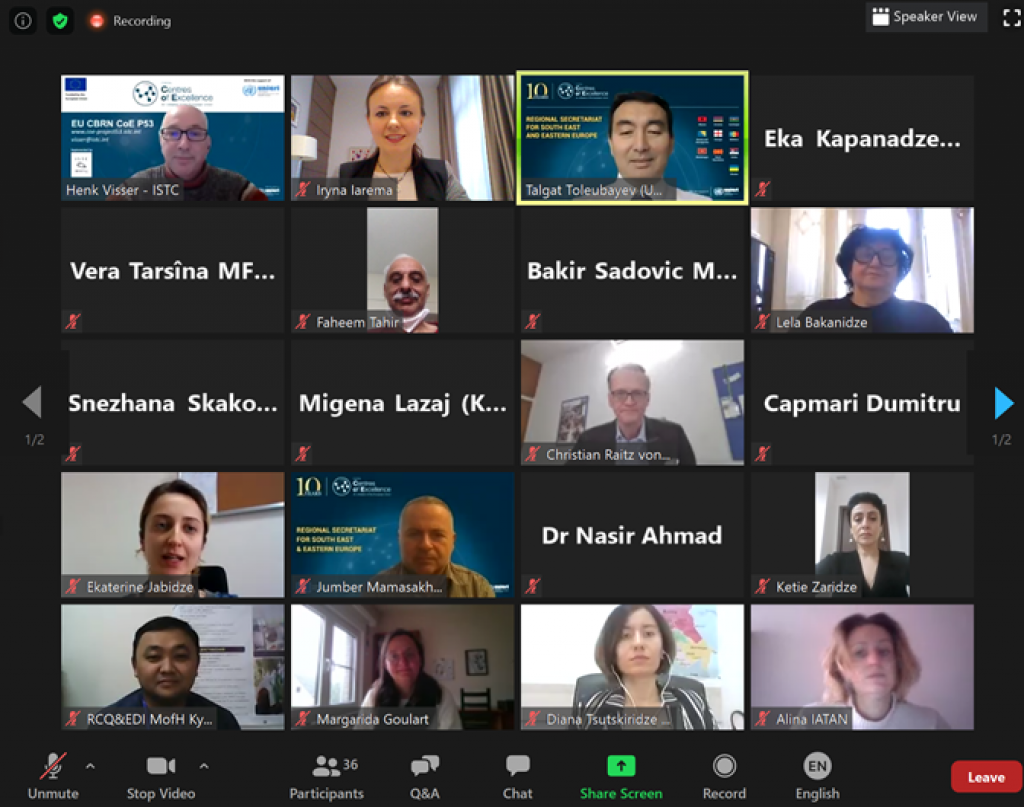
Within the framework of the EU CBRN Centres of Excellence Initiative, the Regional Secretariat for Central Asia (CA) and the Regional Secretariat for South East & Eastern Europe (SEEE) have conducted their sixth Interregional Webinar dedicated to “COVID-19 Interagency Coordination” on 2 December 2020.
The webinar was opened by Mr. Christian Raitz von Frentz, First Secretary Governance, IcSP Regional Cooperation Officer – Central Asia, EU Delegation to Pakistan.
Distinguished experts Ms. Ekaterine Jabidze, Senior Specialist at the Communicable Disease Department, National Center for Disease Control and Public Health of Georgia; Ms. Eka Kapanadze, Head of Division on Planning and Medical Support, Department of Medical and Call Management, LEPL Emergency Situations Coordination and Urgent Assistance Center of Georgia; Mr. Dumitru Capmari, Head of Management of Public Health Emergencies Department, National Agency for Public Health of the Republic of Moldova; and Dr. Faheem Tahir, Principal Scientific Officer in the Public Health Laboratories Division at the National Institute of Health of Pakistan were invited to the webinar to speak about the COVID-19 Interagency Coordination.
The COVID-19 pandemic has been placing a heavy burden on healthcare systems around the world. Rapidly growing demand for the services of health facilities and health workers threatens to exceed the capacity of health systems in some countries, making them ineffective. In such a situation, a very important criterion in the government system is interagency coordination, which helps to balance the need for a response directly to COVID-19 with the provision of essential health services while reducing the risk of system collapse. Interagency coordination involves overseeing the implementation a set of targeted immediate actions that countries can consider at the national, regional and local levels to reorganize high-quality essential health services and ensure that the entire population has access to them.
The webinar allowed its participants to better understand the importance of the interagency coordination during crises such as the coronavirus pandemic. Experts also shared their countries' experiences in combating the COVID-19 pandemic with participation of international organizations. It is noteworthy that interaction with international organizations and institutions greatly facilitated the efforts of all partner countries in overcoming the COVID-19 crisis and helped mitigate its negative consequences.
Mr. Bakhtiyor Gulyamov, the Head of the Regional Secretariat for Central Asia commenting on the completion of the series of the joint interregional webinars mentioned “The coronavirus pandemic created a situation for which many countries were not ready: the population – psychologically, the economy – to function under the quarantine conditions, the healthcare sector – to operate under the health emergency with a sharp increase in hospitalization of people and heightened demands in medical supplies. When the world is still assessing the consequences of the COVID-19 crisis and discussing how best to deal with it, it is important for the national and international entities to share information on good practices and lessons learnt. Thus, I am glad that, specialists from the CA countries together with SEEE region had a chance to deepen their knowledge how to deal with the relatively unstudied novel coronavirus and enhance networking with the peers from the neighboring countries. This undertaking of the two Regional Secretariats epitomized a success in interregional cooperation”.
The Head of the Regional Secretariat for South-East and Eastern Europe, Ms Mari Lursmanashvili emphasized “I am very delighted that these series of online webinars initiated by the Regional Secretariat for South East and Eastern Europe region in close coordination with the Regional Secretariat for Central Asia, allowed us to bring over 300 participants during 6 online webinars, share expertise of 17 experts nominated by 8 different countries and 3 international organizations. Thirteen experts with their PhD academic degrees and several other PhD candidates, spoke about their field of expertise. I truly believe, that these complementary online activities offered by the SEEE and CA Regional Secretariats, bring additional value to partner countries in our regions while addressing COVID-19 crisis and may be successfully replicated in all 62 partner countries within the framework of the EU CBRN Centres of Excellence Initiative. We plan to continue providing our partner countries with this type of value-added services based on areas they prioritize”.
Around 40 participants took part in the webinar, including National Focal Points of CA and SEEE regions, CBRN national experts, representatives of the relevant ministries and agencies as well as representatives of the European Commission and the United Nations Interregional Crime and Justice Research Institute (UNICRI). The webinar was highly appreciated by the participants, who noted that holding such webinars is useful, as it helps to learn various methods and experience of other countries in overcoming the COVID-19 crisis.
This is the last interregional webinar of this format organized in 2020 by the Regional Secretariat for Central Asia and the Regional Secretariat for South-East and Eastern Europe in partnership with the EU CBRN CoE Project 53. The interregional webinars are aimed to provide a decisive contribution to peer-to-peer exchange of experience in CA and SEEE regions, as well as provision of insights from the independent professionals in dealing with the COVID-19 health emergency.
Press Service of the State Committee on Industrial Safety
of the Republic of Uzbekistan